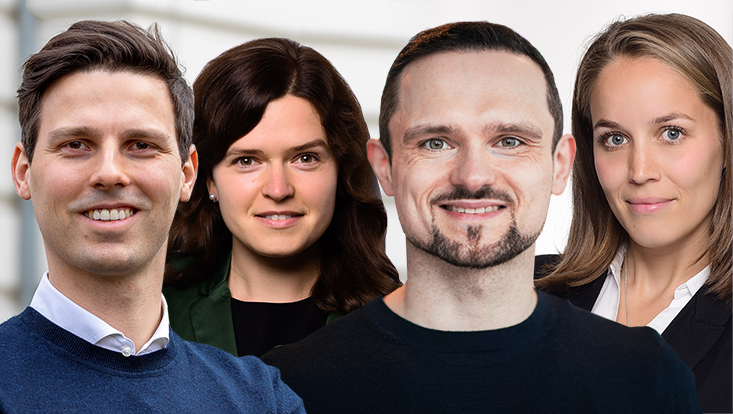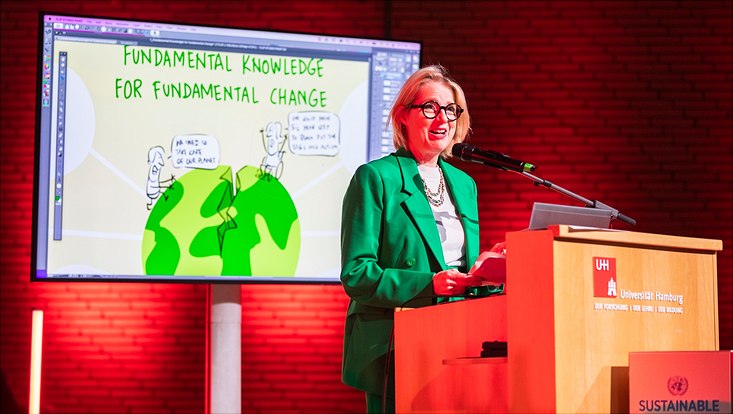After You Get Your Degree Universität Hamburg alumni on their path towards a career
9 February 2023, by Anna Priebe

Photo: UHH, RRZ/MCC, Arvid Mentz; Studioline; UHH/Esfandiari; Studioline
Every year, thousands of students earn their degree here. Hundreds of doctorates are also awarded. And the career options available after that are many and diverse. In this series, alumni from various faculties talk about what they learned at Universität Hamburg and what advice they have for students. To start off, we talked to 4 alumni from the Faculty of Business Administration (Hamburg Business School).
Business administration alumni
Dr. Karla Brinck
- At the University: Doctoral student from 2016 to 2019
- Today: Head of People and Organizational Development at Mazars, a global auditing, accounting, and consulting group.
Both my doctorate and my professional work have focused on human resources, meaning everything related to a company’s staffing. There is a great deal of overlap and I often tap into my academic expertise in my everyday work. Nonetheless, it was still a big change, especially with regard to working approaches. While doing my doctorate, I spent many hours highly concentrated and focused on a single topic. In my job, however, I jump quickly from one topic to another; I am still highly focused but for shorter periods of time.
It was clear to me that I would be involved with HR topics after doing my doctorate, but not in which industry or in what role. I applied to various companies and profited in many cases from my experiences as a student: during your studies, it is very easy to gain insight into various areas. This way, you learn very different disciplines. Thus, I can only recommend doing internships; take on a student job in a company and/or as an assistant within a professorship. That is an excellent way to find out what you really want to do later.

Prof. Dr. Jochen Hartmann
- At the University: Doctoral researcher (in the professorship Marketing and Customer Insight, 2017–2021) and postdoc (in the professorship Marketing and Branding, 2020–2021)
- Today: Professor of digital marketing at the Technical University of Munich
I realized early in my studies that I have a passion for academia. After 2 years as a consultant with McKinsey, I began at Universität Hamburg. I was able to familiarize myself with all aspects of academia and I profited immensely from the various support programs for doctoral and early career researchers. For example, I had multiple opportunities to do research at the Columbia Business School or in St. Gallen.
At a personal level, different mentors supported me, including my doctoral supervisor Prof. Dr. Mark Heitmann, alongside Prof. Dr. Henrik Sattler and Prof. Dr. Oded Netzer. The also advised me when I had to make important decisions about my academic career: for example, during my time as a postdoc at Universität Hamburg, I was offered a position as an assistant professor at Groningen University. Because I was so happy in Hamburg, the move was a hard one for me to make. Ultimately, I decided to go and I didn’t regret it. A career in academia requires a great deal of flexibility, which you need to be aware of. At the same time, it offers a lot of room to shape your own career. I can only advise students considering this career path to find out what you have a passion for, to seek international and interdisciplinary exchange, and to focus on topics that might contribute productively to society.

Anastasia Lebedeva
- At the University: MBA with a focus on logistics and supply chain management (2016–2018)
- Today: Manager in the field of data-driven supply chain management at the managment consulting company Capgemini Invent
It became clear to me quickly in my various internships in, among other things, consulting and supply chain management, that these topics interest me most. This is why I chose that focus in my master’s studies and I specifically applied for companies in the field. Having said that, the finer nuances of the interview process are not necessarily a part of your studies. So I also attended workshops and activities at the Career Center at Universität Hamburg and talked to alumni of my degree program who had already started working and were able to give me valuable tips.
I was also able, of course, to use and deepen my academic expertise in various projects in my job, for example, when preparing and analyzing data or solving different supply chain use cases. I also continue to learn and nurture my curiosity. Learning to never give up and to not fear new challenges are two of the most important things I took away from my master’s studies. Above all, I would advise students, in addition to doing various internships, to enjoy their studies and have fun!
Dr. Lukas Kwietniewski
- At the University: Bachelor’s in socioeconomics with a focus on business administration (2207–2010), MBA (2010–2012), doctorate within the professorship for management in the field of health economics (2012–2016)
- Today: Director of health care analysis for Statista GmbH
I first studied law, but I quit after 3 semesters. My alleged failure inspired me to focus more strongly on my real interests: in the degree programs that followed, I always had a lot of fun working with data and deriving practical solutions. The master’s program and my work as an undergraduate research assistant for Prof. Schreyögg also awakened my interest in academic work.
One of the most important skills that I learned in my studies is definitely how to get organized, to structure my time, and to set priorities—If I would give any advice to students, it is to learn these skills as early as possible, for example, to create weekly plans to prepare for tests. These skills helped me especially in the early years in my job and they still do, even when, over time, the focus of my work has shifted to management and strategy. The expertise I gained in my studies and by doing my doctorate also continue to be an important foundation. The combination of deeper understanding of health system management in my master’s studies and my affinity for working with data sets have been helpful guiding principles in my career. Students, however, should always try out different things. There is nary a person who can precisely plan or predict their own future.




